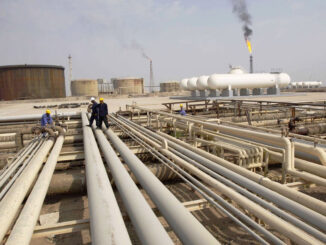
[Scene: Suburbia. A harried wife returning home from work. Angry slamming of a front door.]
“I’m home! Where are you? What the hell is going on? Why is the garage full of cash? I can’t even get the car in! What are you, Heisenberg now?”
“No, no, no. Honey, I can explain! We’re having a really good year at work, like really good -“
“Listen ya mook! You better come clean! You work in natural gas. Furnaces excite you. No one piles up cash like that unless they’re big tech or drug lords. Now again: What’s going on?”
“I’m telling the truth. We had a bunch of inventory, so to speak. All of a sudden everyone’s nuts for the stuff. Bidding wars. You’d think it would be great but…”
[Wife notices open laptop in his hands. Browser open to a site called “Ten foolproof ways to launder money”. She points.]
“So what’s that then?” [Man drops laptop and runs shrieking from the room.]
OK, first things first – stay calm everyone, the above vignette is only a dramatization. All is ‘normal’ in suburbia. Money laundering under IFRS is so onerous that few bother.
But Houston, we do have a problem. And Calgary too. A cash flow problem that is the exact opposite of what most people endure. In the hydrocarbon industry, there is currently more cash being generated than can be properly deployed, and where that cash goes is going to create a problem of significant proportions.
Admittedly, it feels pretty stupid to call this a problem. And people will rightly point out that there were years of low or no cash flow, and that’s just the way it goes in cyclical industries. And they’ll say that complaining about too much cash is about as moronic as it gets.
That’s all true. But it doesn’t mean there isn’t a problem, and as is usual with the hydrocarbon industry, it’s a communications/image problem. Even giving it back to owners is not going to be so easy.
First, some pertinent background. The reason for the excess cash flow is that there is a global shortage of hydrocarbons (which is in turn creating a shortage of many other things that rely on hydrocarbons). Global natural gas prices are through the roof, and oil prices refuse to fall much below $100/barrel despite demand destruction (minimal) and massive releases from the US Strategic Petroleum Reserve. Even coal prices have risen dramatically.
Here’s what high prices do to producer Cash Flow: a research firm earlier this year modelled 2023 CF for an amalgamation of 9 integrated/oil sands companies, 13 large cap producers, and 15 small/mid cap ones. Forecast CF for this group at $70 oil, after capital expenditures, is $190 billion. At $110 oil, that number hits $350 billion. (And this doesn’t include the really big guns like Saudi Aramco…)
Ten thousand shareholders are ecstatic at that news; five billion people get irate. The latter aren’t interested in nuance; erroneously or not, they smell a rat, and they want vengeance (more on that in a second).
In a normal business cycle, high commodity prices are a clear signal for investors to move into the market, and for producers to ramp up production to capture those high prices. Commodities are a cyclical industry, one that seldom sees perfect alignment between supply and demand to the point of steady prices, so the price signals are important rebalancing factors.
A cliche that usually earns one a social media beating is to say: “this time it’s different” – but this time it really is, at least when it comes to hydrocarbon production. Companies are not reinvesting/growing production for a lot of reasons – lack of infrastructure, investor pressure to
return cash to shareholders, and the relentless pop-culture drumbeat that hydrocarbons are a dying industry (what’s actually dying are people/industries from a lack of hydrocarbons, but that’s a whole different story).
We therefore are now seeing producers selling commodities at ridiculously high prices, at the same time that governments roll out climate policy after climate policy that discourages additional production and incentivizes a pivot away from hydrocarbons.
There is little new production on the horizon – few new field discoveries, few new mega projects. 2015-19 benefitted from mega projects kicked off around 2009-14 – a period of sustained prices and “normal” energy business cycles.
Mega projects are harder to launch than WWIII. Literally. Only despotic regimes will approve a new oil mega-project (for example, Canada approved the huge Bay du Nord offshore Newfoundland oil project (whose owners are a long way from proceeding with)).
Big Oil is floundering around in a state of wealthy self-immolation, trying to appease everyone, doing a hundred different things to earn social license. Increasing production is not on that list.
The owners of most of the world’s oil reserves – national oil companies – are shovelling the windfall CF towards otherwise-rioting citizens who for some reason want reliable and affordable energy and a bit of food. Others, not subject to poverty, are finding entirely new toys to spend excess wealth on.
Saudi Arabia is building – I kid you not – a 170-kilometre by 200-meter human petri dish for citizens to exist in called The Line, complete with 170 km glass walls on either side and filled with hundreds of micro-ecosystems. Think of it as moving into a modern shopping mall where you can only leave on monitored and moderated excursions into nearby “wilderness” at designated places. It’s exactly the sort of thing dystopian fanciers and kid’s movies have been predicting forever. And it’s expected to cost about a trillion.
That’s where the money is going. It’s not going back into production growth, yet demand is still rising for all forms of hydrocarbon. And don’t forget that at a 5 percent decline rate, the world needs to add 5 million b/d of production. That is half a Saudi Arabia, or another Canada.
The consequence is as inevitable as it is unexplainable to the general public, which is going to take a utility-bill-beating like they’ve never thought possible, because supply can’t keep up with demand, and governments are actively hindering the recovery process.
As a fairly consistent rule of thumb, the average citizen does not know or care about energy until either: a) it costs a lot more to fill the car, or b) utility bills go up. Then all of a sudden they care a lot.
Because the whole energy complex is so hard to explain, few industry groups step into this void to try to do so, and even if they do, the nuance gets lost in a blank stare of audience boredom.
That is a disaster, because the public’s demand for answers is always sated – but not necessarily by the wise. Into this void steps a ragtag assortment of simplistic dot-connectors who very quickly invent a causal link that sticks, because it is simple and relatable to the public.
Pundits take to social media (and the real media) to point to two irrefutable and widely reported current events: your utility bills are going through the roof at exactly the same time that producers are reporting record profits.
Then boom, that devastatingly simple message, misguided as it is, takes off like a wildfire, because it is easily digested, and anger needs a focal point. Consider Britain, where household utility costs have risen by 54 percent this year already and are expected to rise by a further 116 percent by January. Lower-income citizens may simply have no way to pay these bills.
Harrowing tales of “energy poverty” fill comments sections, and groups such as “Enough is Enough” have soared from birth in July to 20,000 followers in the first week of August to 130,000 a week later and heaven knows who many now. A separate group, Do Not Pay UK, has 100k Twitter followers, hundreds of subchapters, and is organizing a mass boycott of utility payments as of October 1. (The 1990 UK Poll Tax experience provides the template; millions refused to pay a new tax and eventually governments backed down.)
Hundreds of millions of people around the world won’t be able to afford food or pay their heating bills this winter. Industries are simply shutting down due to things like soaring natural gas prices. People will lose their jobs, and then go to homes they can’t afford to heat.
There is no easier connection, in the grossly over-simplified world of mainstream energy commentary, than linking huge hydrocarbon producer profits with soaring utility bills.
The question is: what to do about it?
Governments have limited options. They can subsidize utility bills, which helps but also ensures consumption will continue to be strong. Governments could encourage more conventional energy supplies, but are barred from pursuing the idea by the climate crowd whose representatives dictate most energy policy in the western world (check out Biden’s appointees to the US Department of Energy – some Bloomberg green-reporting refugees, climate activists…not a single representative from the hydrocarbon industry that provides >80% of US energy).
There is little producers can do to help out. Their ‘inventory’ – oil and gas reserves – is in incredibly high demand, and is being bid up in price. What would help alleviate this situation is to find and develop more reserves, but the world’s cultural elite, the group that dominates western political schools of thought, has ‘scientifically’ linked any weather event – anything at all – with climate change, which is linked to ‘fossil fuel combustion’, which is therefore bad, and the mere suggestion of increasing production is unacceptable. To even point out the benefits of hydrocarbons is enough to earn a rapid introduction to cancel culture.
For producers, a mighty storm is brewing. Those new ‘cash-return-to-shareholder’ frameworks, which have been universally adopted, are perfect fertilizer for opponents of hydrocarbons. Their (climate activist) messaging just became ten times easier, with a few of the most basic stats imaginable – hey look, oil companies just distributed a hundred billion to shareholders, and your utility bill went up by the same amount. Grab a pitchfork and let’s go.
The optics are a recipe for disaster, unless the industry finds a better way of explaining itself. First and foremost, the industry needs a spine – no more apologizing for providing fuel for the world’s survival, no more capitulating, no more apologizing for the industry’s very existence. By all means reduce emissions, but draw a line in the sand at the mention of Scope 3 emissions – how people choose to combust hydrocarbons, and for what reasons, is between citizens and governments; it has nothing at all to do with fuel providers.
Be crystal clear: the world’s energy crisis is the product of design, and not just Putin (he was an accelerant, but the process was well underway before his war). The golden goose has had its beak stapled shut.
We need people to stand up and say loudly and clearly that the emperor has no clothes, that humanity is doomed without significant new hydrocarbon investment, that new energy has its place as a supplement and offshoot of the hydrocarbon system, and that to ignore these facts is to doom hundreds of millions. If the industry can’t explain exactly how and why all that cash is accumulating, then they are going to pay for it one way or another (warning shots: British windfall tax on oil/gas producers, and Biden’s new tax on share buybacks). Nuanced logic won’t stand a chance against the dominant mainstream narrative, or against rioting/cold/hungry people.
Source: Boereport.com



